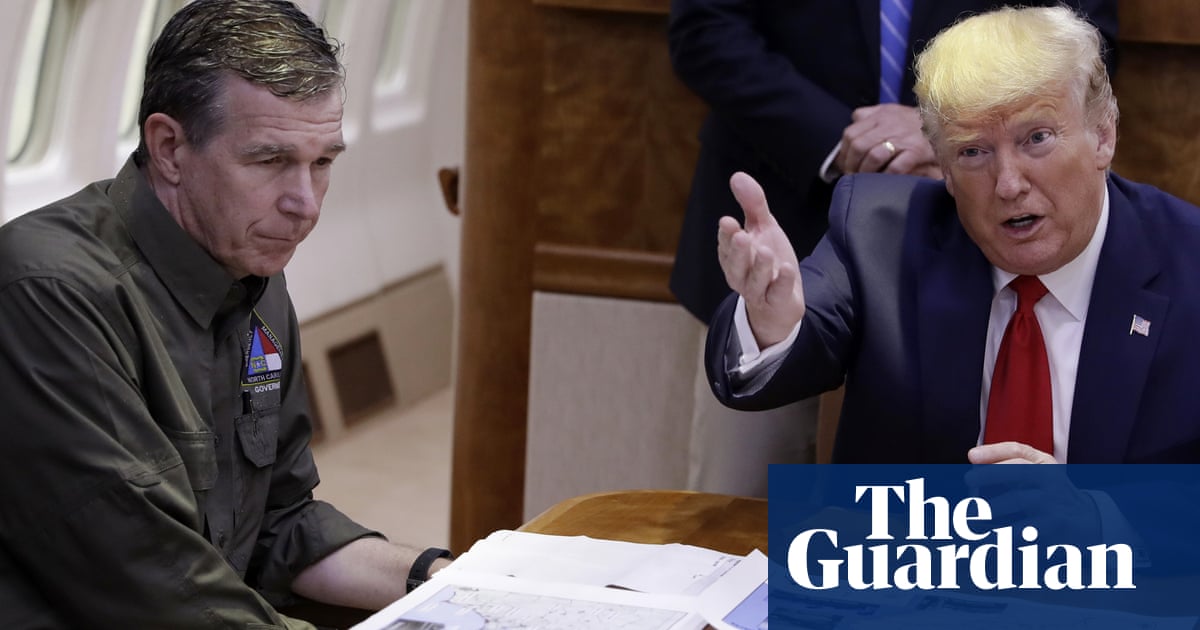
Donald Trump has threatened to move the Republican party’s national convention from Charlotte, North Carolina, if the state is not able to commit to “full attendance” at the gathering despite Covid-19 restrictions.
In a series of tweets on Monday morning. Trump said the state’s Democratic governor, Roy Cooper, was “still in Shutdown mood & unable to guarantee” that the party would be able to fill the arena with supporters.
“I love the Great State of North Carolina so much so that I insisted on having the Republican National Convention in Charlotte at the end of August,” the US president wrote.
“We would be spending millions of dollars building the Arena to a very high standard without even knowing if the Democratic Governor would allow the Republican Party to fully occupy the space.”
Trump added: “If not, we will be reluctantly forced … to find, with all of the jobs and economic development it brings, another Republican National Convention site.”
Trump’s tweets came just two days after North Carolina recorded its largest daily increase in positive cases of the coronavirus yet.
On Friday, Cooper permitted some further loosening of restrictions on hair salons, barbers and restaurants in North Carolina. But he said the state must continue to closely watch virus trends and has ordered entertainment venues, gyms and bars to remain closed.
Cooper did not immediately respond to the president’s threat.
Trump’s threat built on previous antagonism with Cooper. On 15 May, he accused Cooper of “playing politics” with a cautious reopening of the state and said it would be “bad for them” if the state delayed the convention.
“We’ll have a convention. I’m a traditionalist, but we’ll have to see, like everything else, but I think we’ll be in good shape by that time,” he told the Washington Examiner.
The Republican national convention, scheduled for 24-27 August, is the centerpiece of Trump’s re-election campaign. Prior to the pandemic, the RNC was expected to bring 50,000 people to the city.
But North Carolina is currently inphase two of its coronavirus reopening plan and gatherings are limited to 10 people indoors or 25 outdoors.
Cooper, who narrowly won election over an incumbent Republican in 2016, faces a challenge in November’s gubernatorial race from the Republican lieutenant governor, Dan Forest, who has urged a faster reopening of businesses.
Trump’s tweets come a day after approximately 4,000 residents bucked Cooper’s restrictions to watch auto racing in Alamance county.
Plans to outfit the Spectrum Center, an indoor arena owned by the city of Charlotte and operated by its main tenant, the NBA’s Charlotte Hornets, and arrange accommodations, have been thrown into chaos by the lockdown.
The Republican National Committee chair, Ronna McDaniel, has said that the convention would be held at least partly in person and vowed not to hold “a virtual convention”.
McDaniel said the RNC had enlisted a medical adviser and that the party was consulting with Charlotte’s mayor, Vi Lyles, and the governor.
The US health secretary, Alex Azar, said increasing testing capacity would be important but did not say a traditional convention was a certainty.
“There will be a convention in Charlotte. It’s a matter of what it looks like,” the US senator Thom Tillis, a North Carolina Republican who is up for re-election in 2020, told the Charlotte Observer last week.
But Cal Cunningham, the Democratic nominee for the Senate seat, countered that the state should adhere to public health experts’ recommendations.
“We’re certainly not ready to have large gatherings in North Carolina at this point. We can be hopeful that this virus will burn out and disappear before it’s convention time,” Cunningham told the paper. “But that’s not what the public health experts seem to be suggesting. I strongly urge them to be listening.”
Democrats have already delayed their own convention, which is preparing to nominate the former vice-president Joe Biden to face off against Trump. It is planned for Milwaukee, Wisconsin, but there is considerable debate over whether it will be a mostly virtual meeting.



